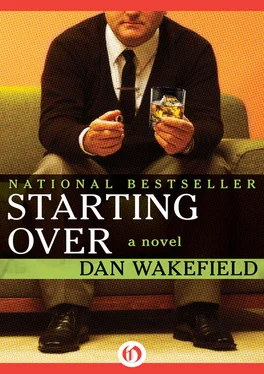Potter felt he had been transported back to his college fraternity game room. Dancing to Sinatra and having a hard-on. And he was thirty-four years old. He had thought it would be different. He didn’t know how or why it should be, he had just assumed it. As in so many cases, he was wrong.
He went to get himself and Carol another drink, and they sat down together on a velvet love seat in the dancing room. Potter noticed Marilyn drift in with the balding man of distinction. He exchanged winks with her, through a green ball of color.
Carol rubbed her hand along his leg.
“I like you, Carol.”
“I can tell,” she said, running her fingers lightly over the top of his taut prick.
“Where do you live?” he asked her.
“Where do you live?”
“ I’m not coy,” he said. “I live at Thirty-four Ellery Street, Cambridge. Ground floor, front apartment.”
“Write it down for me, will you?”
“Sure. But where do you live?”
“Out in the sticks,” she said.
“Which sticks?”
“Suburban sticks.”
“There’s a lot of them.”
“They’re pretty much the same.”
“Well, I don’t know about that.”
“You don’t? Well, I’ll tell you sometime, Phil.”
“When?”
“Wednesday. Any Wednesday.”
“Only Wednesday?”
“What’s wrong with Wednesday?”
“Nothing. Jesus. Wednesday is a fine time.”
“Write it down for me. Where you live. Now, before we forget.”
Potter went to the bathroom, and wrote down his name, address and phone number on the back of an old parking lot stub. He handed it to her and she stuck it down her cleavage, without looking at it. Just like in an old movie.
They danced again, and she undulated against him. He wondered if he could maneuver her up to some empty bedroom. But he didn’t know the house, or the host and hostess, and he dismissed it as too dangerous. He didn’t want a scene. He wondered how Marilyn was doing with her man of distinction. They weren’t in the dancing room anymore. Potter felt a light tap on his shoulder, like the gesture of someone who wanted to cut in.
“Sorry,” the man said.
Potter broke away, smiling awkwardly. “Quite all right,” he said.
Carol smiled at the man and asked if he wanted to dance.
“I want to go home,” he said.
“Do we have to?” she asked. “This early?”
“It’s late enough,” the man said firmly.
Oh, shit , Potter thought, standing up straight and trying to collect himself, trying to look casual and friendly. The last thing he wanted was a New Year’s Eve brawl with some chick’s jealous date.
“I’ll get our coats,” the man said, and left the room.
Carol leaned up against Potter and kissed him, but he gently pushed her away. “You better go on with your date,” he said.
“Oh, him,” Carol said. “He’s not my date.”
“Then how come you have to go home with him?” Potter asked.
Carol shrugged. “Tradition,” she said.
“What kind of ‘tradition’?”
“The regular kind. He’s my husband.”
“Oh,” said Potter, backing away from her. “Well, that makes sense, then.”
Carol smiled. “Does it?” she asked.
It turned out that Potter guessed right about Marilyn’s bald guy being a man of distinction. When they got back to her place she told him the man was a leading psychiatrist in New York City. Furthermore, he had a wife and four children there. Furthermore, he had a date with Marilyn and she intended to keep it. He was charming and brilliant and wealthy.
“And married,” Potter said.
“And bored with his wife,” Marilyn said.
Potter told her about Carol, who was evidently bored with her husband.
“Well,” said Marilyn brightly, “we did pretty good. We’ve both got dates for the New Year.”
“Yeah, but with married people.”
Marilyn, weaving, shucked off her gown. “Don’t knock it,” she said.
“Shit. It just means trouble.”
Marilyn burped, unhooked her bra, and turned to Potter with a look of tired but firm conviction.
“Trouble,” she said, “is better than nothing.”
Potter got a call from Carol at four on Wednesday afternoon.
“Would you like to meet me?” she asked.
“I thought you were coming to my place.”
“I think I’d like it better if we met. Someplace. To have a drink.”
Potter took a deep breath. He wondered if he now was going to have to talk himself into something that he thought was already agreed upon. This seeming change of the ground rules annoyed him, but still, he was curious. Besides, he had nothing better to do, and he’d been looking forward to the event. If it led to trouble, maybe Marilyn was right, that trouble was “better.”
Than nothing.
That was even more likely to kill you than an angry husband.
Nothing.
“OK,” he said. “Wherever you say.”
It was a sort of cocktail lounge on top of the Wursthaus restaurant in Cambridge. He had often been to the Wursthaus, but he never knew it had this little cocktail lounge overhead. Not too dark, not too light, not too populated. He wondered if Carol went there often. On Wednesdays.
“I guess I was pretty drunk,” she said. “When we met.”
Jesus. He wondered if the whole thing was going to be an apology, an explanation of an embarrassing misunderstanding.
“I guess we both were,” Potter said.
She ordered a daiquiri. He ordered a double Scotch on the rocks.
She was wearing a grey suit, and proper pearl earrings. She looked as if she were on her way to some kind of legal meeting.
“I have three children,” she said.
“Oh?”
“Two girls, twins. And a boy.”
He didn’t know how he was supposed to react to this information.
“That must be nice,” he said.
“Sometimes.”
The drinks came, and she looked down into hers for a while, as if it might reveal something.
“Do I look that old?” she asked.
“No,” Potter said quickly. “How old do you mean?”
“To have three children.”
“Jesus, you could be twenty for all I know. A person twenty could have three children. Especially if two were twins.”
He figured she must be somewhere in her early thirties.
“Thanks,” she said.
He didn’t want to say “You’re welcome,” so he said nothing and took a swig of his drink.
“I said Wednesday because that’s when my husband goes to Providence. He teaches an art course there. On Wednesday and Thursday. But Thursdays I have dance class.”
“So that leaves Wednesdays.”
“Yes,” she said, “that leaves Wednesdays.”
She started sipping her daiquiri then, and telling how her husband had a girl he stayed with in Providence, one of his art students, and how for the children’s sake they had agreed not to get a divorce, and not to ask questions of one another’s private life. They didn’t talk much about anything anymore, and didn’t sleep together anymore, and yet they weren’t angry toward each other. They just didn’t feel anything, one way or other.
With the second daiquiri she told how he once had dreamed of going to New York and making it as a painter and then he got her pregnant and it was twins for godsake and he took that as a sign and got a job as a commercial artist and when she urged him to keep up his real work, the work that he loved, he got the part-time job teaching at the Rhode Island School of Design, in Providence. After he got the part-time job he got the studio, and after he got the studio he got the girl to go in it.
“I still like marriage, though,” she said. “In the ideal. But I guess it never happens there—in the ideal.”
Читать дальше












